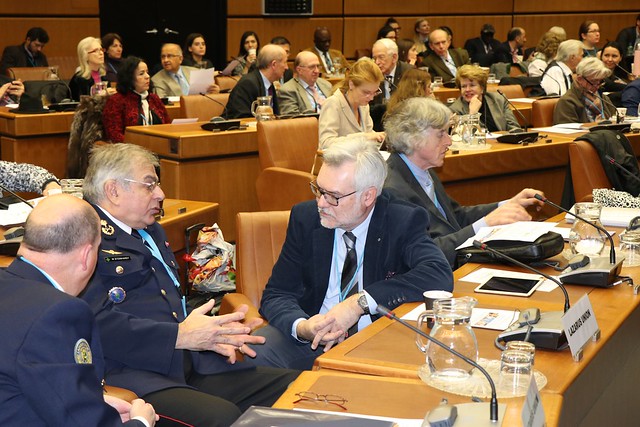Vienna, Austria—Approximately 200 persons attended a UPF-Austria conference at the United Nations offices to mark World Interfaith Harmony Week 2017.
"Toward Peace and Reconciliation in Conflict Zones—The Role of Religions" was held at the Vienna International Centre on January 27. The participants included UN diplomats, religious leaders, NGO representatives and other members of civil society.
This fifth consecutive annual celebration held in the UN building in Vienna was organized jointly by UPF-Austria and Women's Federation for World Peace (WFWP), an affiliated organization, as well as the United Nations Correspondents Association Vienna (UNCAV-Press), the Best of the World Network, and the International Institute for Middle East and Balkan Studies (IFIMES).
In his welcome address Mr. Peter Haider, president of UPF-Austria, stated that peace can be fully accomplished only when the wisdom and efforts of religious leaders, who represent the internal concerns of the mind and conscience, work cooperatively and respectfully with government officials who have practical wisdom and worldly experience.
A video was shown of the World Interfaith Harmony Week anthem, "The Gift of Love," sung by Azeri-British singer Sami Yusuf.
The first session, moderated by Jacques Marion, regional secretary general of UPF for Europe, was opened by H.E. Hussam Abdullah Al Husseini, the ambassador of Jordan to Austria. Reminding the audience that World Interfaith Harmony Week was initiated by H.M. King Abdullah of Jordan at the United Nations in September 2010, Ambassador Al Husseini spoke about the role of religions in peacebuilding, emphasizing that interreligious harmony was a prerequisite for peace in the world.
Rev. Dr. Ihor Shaban, the chair of the Commission on Ecumenical and Interreligious Affairs of the Ukrainian Greek Catholic Church, spoke about the stabilizing role of the Greek Catholic Church in his war-torn country. He also described the challenges experienced by Ukrainians in the face of the divisive pressure exerted by their powerful neighbor and the tensions this has caused among Orthodox churches in the region.
Ms. Lama Al Atassi, a Syrian political activist based in France, involved since 2011 in Syrian opposition activities, spoke of her expectation for her country to overcome internal divisions by focusing on the recognition of Syrian cultural diversity, and promoting its development within the framework of “secularity” in Syria. She called for reconciliation and peace to promote understanding among ethnic groups while highlighting equality.
Linking justice to both religion and peace, Ms. Nada El Jarid, a political and cultural advisor at the Permanent Mission of the Kingdom of Morocco to the UN in Vienna, gave a brief overview of her country’s religious and cultural diversity. She emphasized the importance of combining the efforts of religious leaders with those of national political leaders. Peace is possible when people are considered not only as political, economic and social beings but also as spiritual entities, she said.
Professor Anis Bajraktarevic, a professor of international law and global political studies and the IFIMES representative in Vienna, concluded the session with an assessment of the political and religious interplay in Europe and the Middle East. He warned against trading freedom for security and asserted that the Austrian government was sending conflicting signals. Noting that peace requires much more than the absence of war, he called for meetings of culture and dialogue.
The second session was chaired by Ms. Heather Wokusch, the liaison officer for the Academic Council on the United Nations System (ACUNS) Vienna. Opening speaker Mr. Mayank Sharma, a counselor in the Embassy of India in Vienna, echoed the sentiment that true peace requires more than absence of conflict. He called for the development of structures and tools that reinforce peace and warned of the dangers of simplification in conflict.
In an upbeat presentation, Dr. Wendelin Ettmayer, former member of the Austrian Parliament and ambassador to Finland, Canada and the Council of Europe, asserted that the logic of war had been replaced by the logic of peace in European states. He insisted that when war is an integral part of the political system, fundamental systemic changes must take place in order to achieve lasting peace.
A spotlight on the practice of dance arts as a tool for the cultivation of spirituality was provided by Ms. Tatjana Sehic MA, program director of the Institute for Cultural Diplomacy in Berlin. After presenting two examples of her artwork, she concluded with a video trailer of a dance initiative for a "public tribute and ritual for peace" regarding the terror attacks of September 11, 2001.
Dr. Gottfried Hutter, a theologian and psychotherapist from Munich, Germany, invoked Dr. Martin Luther King Jr. in describing his own dream of creating lasting peace in the Middle East. Reconciliation is possible, he said, when one understands the “story” of one's counterpart, expresses regret, and asks for compassion.
Describing his own peace initiative, Dr. Leo Gabriel, a social anthropologist and journalist, noted that religions are not inherently peaceful. As the initiator of peaceinsyria.org, he described the significant efforts that had gone into creating multilateral discussions which eventually led to the Final Declaration of the Conference on a “Future Syrian Constitution.”
In closing the conference, Mr. Peter Haider noted that this age of globalization needs enlightened people of each faith who can examine their sacred writings and traditions and identify aspects benefiting all of humanity as well as those preserving each religion's identity.

